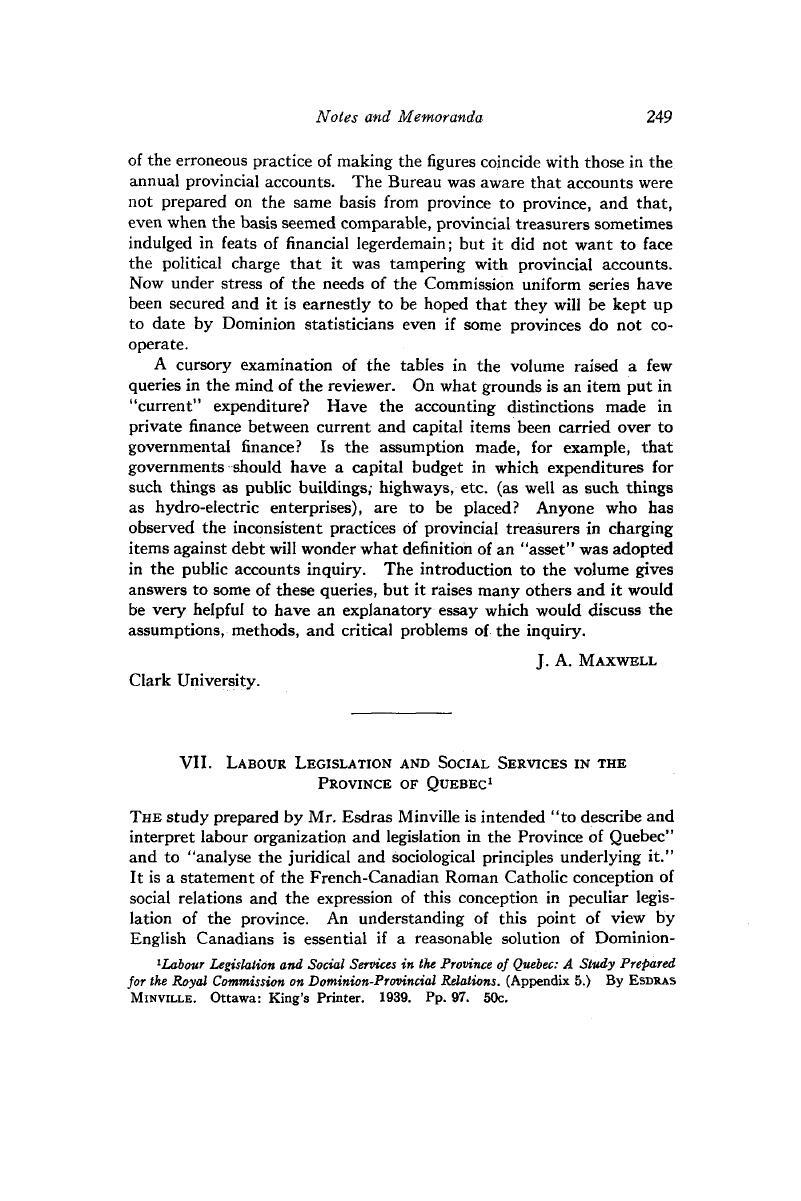No CrossRef data available.
Article contents
On Some Appendices to the Rowell-Sirois Report: VII. Labour Legislation and Social Services in the Province of Quebec1
Published online by Cambridge University Press: 07 November 2014
Abstract

- Type
- Notes and Memoranda
- Information
- Canadian Journal of Economics and Political Science/Revue canadienne de economiques et science politique , Volume 7 , Issue 2 , May 1941 , pp. 249 - 259
- Copyright
- Copyright © Canadian Political Science Association 1941
Footnotes
Labour Legislation and Social Services in the Province of Quebec: A Study Prepared for the Royal Commission on Dominion-Provincial Relations. (Appendix 5.) By Esdras Minville. Ottawa: King's Printer. 1939. Pp. 97. 50c.
References
2 See Leo, XIII, Rerum Novarum, 1891 Google Scholar; Pius, XI, Quadragesimo Anno, 1931 Google Scholar, and Divini Redemptoris, 1937.
3 Catholic thinkers distrust a situation that involves the necessity of giving the state far-reaching powers, other than as a temporary expedient. The “Distributists,” among the leaders of whom are Hilaire Belloc and the late G. K. Chesterton, would prefer to meet these social problems by redistributing real property, that is, the actual implements of production, to the workers. They would bring about a situation where small-scale organization would be typical of industry, except in a “few” cases where state enterprise would be essential from an economic point of view. A recent example of this viewpoint is Agar, Herbert, Land of the Free (Boston, 1935).Google Scholar
4 It is important to consider what the term “liberalism” means to Catholic writers. “Liberalism” is an error condemned by various encyclicals issued during the nineteenth and twentieth centuries. Leo XIII summed up the whole error in the single phrase, “Every man is a law unto himself.” It is the idea of lack of restriction or lack of authority. To the Catholic, authority is an essential social fact. Liberty flows from the inherent dignity of the human person, with his inalienable rights, as a result of his nature as a man, possessed of a soul. The Catholic contends that the approach of the natural rights and utilitarian schools, believing that social order would result from a society based on competition alone as an organizing principle, has “inevitably” led to the fight for power that concentrated wealth in the hands of the few and developed monopolies. Accordingly, it is contended that the former liberal, with the failure of the realization of his ideal, becomes a socialist or communist, advocating the totalitarian solution. Catholics hold that the failure to recognize the importance of personality (each man possesses a soul) leads to an easy yielding to the errors of totalitarianism.
Mr. Minville and other Catholic writers are attacking the theoretical liberal, who is opposed to authority. However, many who call themselves liberals advocate and espouse programmes of reform that often approach the Catholic viewpoint. Catholics would consider that such individuals are in the Christian rather than in the liberal tradition. They are to be condemned only if their avowed fundamental principle is the undesirability of authority. (For the attitude towards “Liberalism,” see, e.g., Appendix 5 of Maritain, Jacques, The Things that Are Not Caesar's, New York, 1930).Google Scholar
5 That is, “organic” economy.
6 “The eminent dignity of the human person,” and the rights associated therewith are stated on page 8 of the Minville report.
7 Public Assistance and Social Insurance, Appendix 6, and the mimeographed appendices on labour Legislation, Public Health, and Housing.
8 The Catholic unions are on record in favour of a system of national unemployment insurance “on condition that the autonomy of the provinces be safeguarded.” This autonomy is to be construed as very important, in order that Quebec may continue experimenting along the lines of Catholic social philosophy.
9 The nature of the collective agreement in Quebec and its extension in the Acts of 1934 and 1937 are discussed in the report.
10 Labour Legislation.
11 In contrast to this approach, Dr. Grauer suggests the virtues of a national system of unemployment insurance as “its administrative simplicity and economy and the greater protection it gives to both the workers and to the public treasuries by its complete coverage” (Public Assistance and Social Insurance, p. 68).
12 Public Health.
13 Maritain, Jacques, Scholasticism and Politics (New York, 1940), pp. 69, 76.Google Scholar




